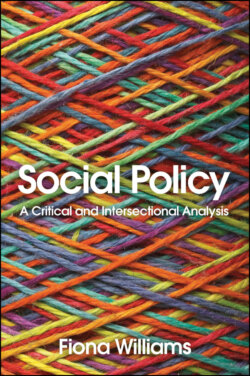Читать книгу Social Policy - Fiona Williams - Страница 25
Intersections of colliding crises
ОглавлениеThe final point is that these four crises are interconnected: they have commonalities in constitution and effect, as well as interlocking dynamics. The commonalities include not only endangering sustainability and solidarity for future generations but also that they challenge the patriarchal, racial and eco-social dimensions of neoliberal capitalism and its modes of production, reproduction, consumption, accumulation, commodification and growth of which they are the outcome. A similar observation is made by Gargi Bhattacharyya in her eloquent elaboration of the term ‘racial capitalism’. This she defines as constituting three interlocking regimes – exploitation, expropriation, expulsion – which bring together the racial, social reproductive and ecological crises: ‘[I]n a time of ecological crisis, populations already depleted by exploitation or expropriation or both become increasingly vulnerable to expulsion’ (Bhattacharyya 2018: 37).
I have already begun to point to some of the intersections of the four crises. For example, neoliberalism and the financial crisis have given rise to greater precarity of labour and to austerity cuts in social expenditure. These hit women hardest by removing support for caring responsibilities and by its impact on those who work in care services, as well as those who have care needs. Most developed countries have come to depend upon migrant workers to keep down their labour costs of health and social care services enforced by social expenditure cuts, and, at the same time, those rights of migrant workers have been curtailed (see chapter 6). Declining citizenship rights and the backlash against multiculturalism reduce migrant workers to units of labour or ‘surplus populations’ (Bhattacharyya 2018). Some policies introduced to restrict the rights of asylum seekers or migrants to housing or income support have subsequently been extended to other groups of benefit claimants as part of austerity policies (see chapter 4). This interweaving of people both exploited and expropriated that extends beyond (but mostly includes) racialized groups is part of the ‘new logic of political subjectivation’ of financialized capitalism (Fraser 2016a: 176). In particular, debt – the very motor of the global financial crisis – not only leads to housing dispossession in the developed world but also creates the means by which agricultural workers in developing countries lose their land to corporations growing or finding new forms of profitable energy. In this way they face expulsion, the third consequence of this logic. Expulsion was also the fate of migrant domestic workers sacked by their employers at the beginning of the Covid-19 pandemic (see chapter 6).
Flood disasters in low-income countries hit women hardest in terms of exacerbating and endangering both their caring and earning responsibilities. Furthermore, climate change is currently leading to greater displacement of people and enforced mobility into a world in which mobilities are increasingly restricted. According to the Asian Development Bank, by 2009, several million people had been displaced by rising seas and typhoons in South Asia (cited in Floro 2012). However, the intersection of these two crises needs to be conceptualized and debated carefully. Highlighting the urgency of attention to climate change often resorts to discourses of securitization and the apocalyptic threat of the clamour of displaced refugees and conflicts as resources become scarce. Yet these feed into the very ethno-nationalist ‘othering’ discourses that have degraded the lives of migrants and refugees. Sager (2020: 15) counsels: ‘While climate change will no doubt contribute to migration, this ignores a potentially even more perturbing scenario: a crisis of stasis in which people who do not have access to basic resources are unable to migrate.’ In this sense, the pandemic crisis was a dress rehearsal.
Within the present neoliberal paradigm, the market is seen as the dynamic and flexible solution to the financial, environmental, mobility and care crises through green technologies or access to care markets. However, these not only tend to deal with the short-term rather than the long-term, and therefore to postpone the basic tensions they precipitate, but they do not attend to the existing inequalities and distributional imbalances of which they are part (Floro 2012: 22; Pettifor 2020). As Ian Gough has argued, the more that climate change and its policies fall on degraded welfare states, the more the poorest groups will suffer. More globally, this creates a ‘tragic contradiction between growth, climatic instability and egregious inequality. All strategies to eliminate global poverty are untenable unless the shares of the poor are raised: in other words unless a more equitable model of the global economy is introduced’ (Gough 2017: 83). It is also the case, as I have been arguing in this section, that ‘the poor’ are created by a postcolonial geo-politics which is regionalized, gendered and racialized and whose capabilities for sustainability are being depleted. Furthermore, the material conditions in which the capacity to provide or receive quality care is depleted is mirrored in the ‘carelessness’ which underpins the treatment of migrants and refugees.
Both singly and together, the implications of these crises profoundly challenge the principles and practices of capitalism and particularly of neo-liberal patriarchal and racial global financialized capitalism. Importantly, they are contested by global and local activists and social movements. Most dramatic have been Extinction Rebellion in 2019 and the second wave of Black Lives Matter in the middle of the global pandemic (see chapter 4). The translation of the Chinese word for crisis is ‘danger at the point of juncture’, popularly understood as positing both danger and opportunity. In this sense, in these contestations new ethical and political bases for future strategies, alliances and alternatives are being articulated. This is a story I pick up in chapter 7.
